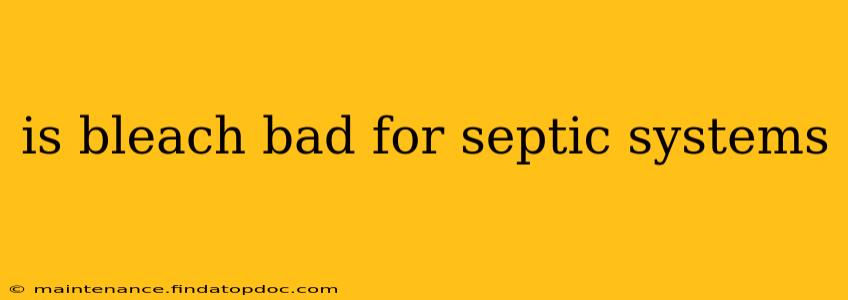Bleach is a common household cleaning agent, but its potent chemical properties raise concerns about its impact on septic systems. The short answer is: yes, excessive bleach use can be harmful to your septic system. However, understanding why and how it's harmful is crucial for responsible septic system maintenance. This guide will delve into the specifics, answering common questions and offering practical advice.
How Does Bleach Affect Septic Systems?
Bleach, primarily sodium hypochlorite (NaClO), is a powerful oxidizing agent. In a septic system, this means it can kill not only harmful bacteria but also the beneficial bacteria responsible for breaking down waste. These beneficial bacteria are vital for the proper functioning of your septic tank and leach field. Killing them off disrupts the natural decomposition process, leading to several potential problems.
What Happens When You Pour Bleach Down the Drain?
When you pour bleach down the drain, it enters your septic tank. While a small amount might not cause immediate damage, consistent and excessive use can lead to:
- Reduced Waste Breakdown: The death of beneficial bacteria slows down the decomposition of organic waste, leading to a buildup of solids in the tank. This buildup can eventually block pipes and clog the system.
- Septic Tank Sludge Accumulation: The incomplete breakdown of waste results in increased sludge, which can require more frequent and costly pumping.
- Leach Field Clogging: The partially decomposed waste can enter the leach field, clogging the soil pores and preventing proper drainage. This can cause sewage backup into your home.
- Corrosion: Bleach can corrode certain components within the septic system, particularly metallic parts.
How Much Bleach is Too Much for a Septic System?
There's no magic number for how much bleach is "too much." The impact depends on various factors, including the size of your septic system, the frequency of bleach use, and the overall concentration of the bleach. However, it's generally recommended to minimize bleach use as much as possible. Opt for environmentally friendly cleaning alternatives whenever feasible.
What are the Alternatives to Bleach for Cleaning?
Fortunately, there are many effective and septic-system-friendly alternatives to bleach:
- Baking Soda and Vinegar: This classic combination is surprisingly powerful for cleaning many surfaces.
- Borax: A natural mineral that's excellent for laundry and cleaning.
- Enzyme Cleaners: These cleaners contain beneficial bacteria that help break down organic matter, promoting a healthy septic system.
- Washing Soda: Another natural cleaner that is effective yet gentle on septic systems.
Remember to always check the product label to ensure it's safe for septic systems.
Can Bleach Kill Septic Tank Bacteria Completely?
While bleach can significantly reduce the population of beneficial bacteria, it's unlikely to completely eradicate them. The bacteria are resilient and can often recover if bleach use is minimized. However, repeated exposure to high concentrations of bleach can severely damage the bacterial ecosystem, leading to prolonged dysfunction of the septic system.
What are the Signs of a Failing Septic System?
Recognizing the signs of a failing septic system is crucial for preventing costly repairs. Some common indicators include:
- Slow Drains: Water drains slowly in sinks, showers, and toilets.
- Gurgling Sounds: You hear gurgling noises from drains.
- Sewage Backup: Sewage backs up into your house.
- Foul Odors: You notice unpleasant smells near the drainfield.
- Soggy or Lush Spots in Your Yard: These could indicate that wastewater is not properly draining.
If you notice any of these signs, contact a qualified septic system professional immediately. Ignoring the problem can lead to significant damage and expense.
Conclusion: Protecting Your Septic System
While occasional, diluted use of bleach may not cause severe damage, consistent and heavy use is detrimental to the health of your septic system. Adopting environmentally friendly cleaning practices and minimizing bleach use is the best way to ensure the longevity and efficient functioning of your septic system, saving you time, money, and hassle in the long run. Remember that proactive maintenance and regular inspections are key to preventing major issues.
